
The Kamen Rider Series, also known as Masked Rider Series, is a Japanese superhero media franchise consisting of tokusatsu television programs, films, manga, and anime, created by manga artist Shotaro Ishinomori. Kamen Rider media usually revolves around the titular defined group of motorcycle-riding superheroes with an insect motif who fights supervillains, often known as kaijin.

Kamen Rider Blade the Movie: Missing Ace is the theatrical superhero film adaptation of the Japanese 2004 Kamen Rider series, Kamen Rider Blade, directed by Hidenori Ishida and Katsuya Watanabe and written by Toshiki Inoue.

"Anything Goes!" is a song by Japanese recording artist Maki Ohguro, her 32nd single in her over twenty-year-long career. The song serves as the opening theme of the 2010-2011 Kamen Rider Series Kamen Rider OOO. The single for the song was released on November 17, 2010, as a standard CD release and a CD+DVD release featuring the music video for the song. On September 15, 2010, Avex released the opening sequence edit of the song to digital music outlets. The single includes 3 variations of the song: the single cut, a ska edit, and the instrumental track. Japan-based rapper Rah-D is featured on the track. "Anything Goes!" is Maki Ohguro's first single in 11 years to break the top 10 of the Oricon at number 7, after selling 33,000 copies in its first week of release.

Kamen Rider Kiva, stylized in English as Masked Rider Kiva, is the 2008 Kamen Rider Japanese tokusatsu television series produced by Toei Company and Ishimori Productions. It is the series' ninth series in its Heisei era, and 18th series overall since the debut of Kamen Rider in 1971. It premiered on January 27, 2008, following the finale of Kamen Rider Den-O, and aired as a part of TV Asahi's 2008 Super Hero Time block with Engine Sentai Go-onger. The series was advertised to have horror film themes, such as Kamen Rider Kiva being a vampire. The first episode began with a commemoration of the series in honor of the seventieth anniversary of Shotaro Ishinomori's birthday.

Kamen Rider Decade, stylized in English as Masked Rider Decade or Masked Rider DCD, is a Japanese television show and the 2009 installment of the long-running Kamen Rider series of tokusatsu dramas. Decade, as its title suggests, is the tenth anniversary series of Kamen Rider's Heisei era, and the final installment of its first phase. It began broadcasting the week following the finale of Kamen Rider Kiva and was featured in Super Hero Time alongside the 2009 edition of the Super Sentai series, Samurai Sentai Shinkenger. Kamen Rider Zi-O, the last Heisei-era series, broadcast in 2018–2019, acts as a spiritual sequel, where both Decade and Diend play prominent roles as re-occurring side characters who are directly involved in that series's plotline.

Samurai Sentai Shinkenger is the title of Toei Company's thirty-third entry in its long-running Super Sentai metaseries of Japanese tokusatsu television series. It aired from February 15, 2009, to February 7, 2010, replacing Engine Sentai Go-onger and was replaced by Tensou Sentai Goseiger. It joined Kamen Rider Decade as a program featured in TV Asahi's Super Hero Time programming block, and following Decade's finale, it aired alongside Kamen Rider W. It incorporates elements from the Jidaigeki drama genre and Japanese themes and aesthetics. The catchphrase for the series is "Authorized by divine providence!!". This is the first Super Sentai series to be filmed in HD with an HD camera having its resolution done at 720p.
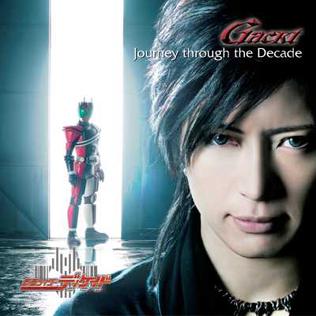
"Journey Through the Decade" is a song by Japanese pop singer Gackt, serving as his thirtieth single released on March 25, 2009. It is his first song performed for Kamen Rider Decade, used as the television series' theme song.
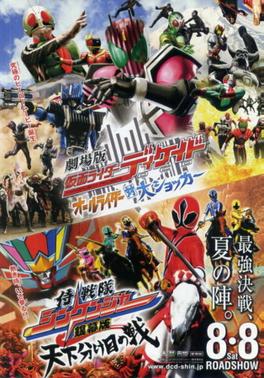
Kamen Rider Decade the Movie: All Riders vs. Dai-Shocker is the superhero film adaptation of the 2009 Kamen Rider Series Kamen Rider Decade. The main protagonists of Kamen Rider W make their debut in the film.

Kamen Rider W, also called Kamen Rider Double, is a 2009–2010 Japanese tokusatsu drama, the eleventh series in the Heisei period run of the Kamen Rider Series and the twentieth overall. It premiered following the finale of Kamen Rider Decade on September 6, 2009, and aired alongside Samurai Sentai Shinkenger in TV Asahi's Super Hero Time programming block. Following Shinkenger's finale, it aired alongside Tensou Sentai Goseiger, until W concluded on August 29, 2010. The series is described as the "Heisei Kamen Rider 10th Anniversary Project: Fall Campaign". In the first episode of Kamen Rider Fourze, W is revealed to be in the same continuity as the original Showa timeline, making it the first series to do so since Kamen Rider Agito. The series is notable for being the first installment in what's popularly viewed as Heisei era Kamen Rider's second phase by fans. A sequel manga series, Fuuto PI, began serialization in August 2017 and an anime adaptation began airing in August 2022.

"The Next Decade" is the thirty-fifth single by Japanese musical artist Gackt, released on August 11, 2009.
Kamen Rider Den-O is the seventeenth installment in the popular Kamen Rider Series of tokusatsu programs. As part of the series, several musical releases through Avex Mode were made for the series opening themes, ending themes, image songs, and original soundtracks. Most songs are rearrangements of the initial opening and ending themes.
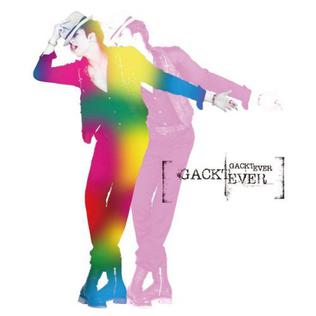
"Ever" is the thirty-eighth single released by Japanese solo artist Gackt, released on July 28, 2010, by Avex Group. It was the theme song for the multiplayer online role-playing video game Dragon Nest.

Kamen Rider OOO is a 2010–2011 Japanese tokusatsu drama in Toei Company's Kamen Rider Series, being the twelfth series in the Heisei period run and the twenty-first overall. It began airing on September 5, 2010, the week following the conclusion of Kamen Rider W, joining Tensou Sentai Goseiger and then Kaizoku Sentai Gokaiger in the Super Hero Time lineup, until its conclusion on August 28, 2011. The series' titular Kamen Rider made a cameo appearance in the film Kamen Rider W Forever: A to Z/The Gaia Memories of Fate and a supporting character in other Kamen Rider movies.
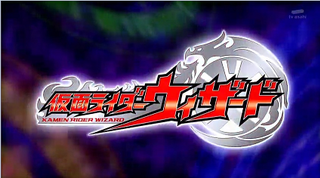
Kamen Rider Wizard is a Japanese tokusatsu drama in Toei Company's Kamen Rider franchise, being the fourteenth series in the Heisei period run and the twenty-third overall. It began airing on TV Asahi on September 2, 2012, joining Tokumei Sentai Go-Busters and then Zyuden Sentai Kyoryuger in the Super Hero Time lineup. Tsuyoshi Kida is the series' main screenwriter.
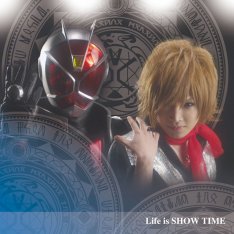
"Life Is Show Time" is the debut solo single of Golden Bomber vocalist Shō Kiryūin. It serves as the opening theme song to the 2012 Kamen Rider Series Kamen Rider Wizard. In recording the song, Kiryūin stated that he felt closer to being like his idol Gackt, who performed a previous Kamen Rider Series' theme song in 2009. The single had 4 editions released: a standard CD release, a standard DVD release containing the music video, and two additional limited edition DVD releases subtitled "Oni" and "Ikusa" which include edited versions of the music video.

"Just Live More" is a song by Japanese reggae band Shōnan no Kaze under the name "Gaim no Kaze", released on December 11, 2013. It serves as the opening theme song for the children's television series Kamen Rider Gaim.

Kamen Rider Drive is a Japanese tokusatsu television series serving as the 16th Heisei Kamen Rider Series, and 25th series overall. Riku Sanjo returns to the Kamen Rider Series to serve as Drive's lead screenwriter, with Ryuta Tasaki as director. It premiered on TV Asahi and affiliate stations throughout Japan on October 5, 2014, the week following the finale of its preceding series Kamen Rider Gaim, and joining Ressha Sentai ToQger then Shuriken Sentai Ninninger in the Super Hero Time programming block, until Drive concluded on September 27, 2015. Drive is peculiar among the heroes in the Kamen Rider franchise, as his motif and main mode of transportation is a car, rather than the signature motorcycles used by his predecessors.
Kamen Rider Ghost is a Japanese tokusatsu drama serving as the 17th Heisei Kamen Rider Series, and 26th series overall. Takuro Fukuda serves as Ghost's lead screenwriter, with Satoshi Morota as director. It premiered on TV Asahi and affiliate stations throughout Japan on October 4, 2015, the week following the finale of its predecessor series Kamen Rider Drive, joining Shuriken Sentai Ninninger, and later, Doubutsu Sentai Zyuohger in the Super Hero Time programming block.

Kamen Rider Zi-O is a Japanese tokusatsu drama in the Toei Company's Kamen Rider franchise. It is the twenty-ninth Kamen Rider series overall as well as the twentieth and final installment in the Heisei period. The show premiered on September 2, 2018, following the finale of Kamen Rider Build, joining Kaitou Sentai Lupinranger VS Keisatsu Sentai Patranger and later, the miniseries Super Sentai Strongest Battle, followed by Kishiryu Sentai Ryusoulger, in the Super Hero Time line-up.
Kamen Rider Revice is a Japanese tokusatsu drama and the 32nd entry of Toei Company's Kamen Rider metaseries. It is the third series to debut during the Reiwa period and commemorates the 50th anniversary of the franchise. The series premiered on September 5, 2021, joining Kikai Sentai Zenkaiger and later, Avataro Sentai Donbrothers in the Super Hero Time line-up following the finale of Kamen Rider Saber and was followed by Kamen Rider Geats after its own finale. Aside with the animal/bird/dinosaur motif, the series uses a genome motif.



















